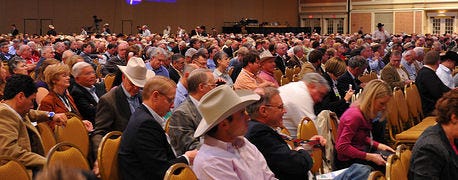February 5, 2014

The National Cattlemen's Beef Association's Cattlemen's College kicked off Cattle Industry Convention activities on Feb. 3-4, 2014.
The 2014 edition of Cattlemen's College was sponsored by Zoetis and offered a wide range of informative, hands-on educational workshops designed for cattle operations of every size and sector.
Cattlemen's College participants heard from an outstanding lineup of industry experts during the course of two jam-packed days. On Mon., Feb. 3, participants heard from Dr. Arne Anderson as he discussed the "dos" and "don'ts" of processing cattle through a chute, with emphasis placed on safety and efficiency for both the cowboys and the cattle.

Cattlemen's College allows producers to take on industry challenges from production to marketing
Following this presentation, Dr. Jerry Lipsey and Dr. Kent Anderson shifted focus to the selection of herd replacements. Dr. Lipsey demonstrated how to select replacement heifers for longevity in a presentation, and Dr. Andersen discussed combining cowboy common sense for soundness and adaptability traits with the disciplined use of Expected Progeny Differences for combinations of calving ease, growth, efficiency, carcass and maternal traits in selecting replacement bulls.
Monday evening, Cattlemen's College participants visited with fellow cattlemen as well as the afternoon's speakers at a reception sponsored by Certified Angus Beef.
Cattlemen's College classes started back Tuesday with a keynote address by Bob Langert, who is the corporate vice president, and leads corporate social responsibility & sustainability for McDonald's Corporation.
Langert shared McDonald's overall sustainable supply chain vision and beef's role in the company's plan. Langert also discussed how McDonald's is working with various stakeholders, including all parts of the value chain, to collaborate on social and environmental opportunities and challenges as sustainability in the industry continues to evolve.
"If we don't invest on sustainability, we're not going to have all the customers we want in the future," Langert said. "At McDonald's we know what were good at, and we know what were not good at. What we're good at is running restaurants, but we need to rely upon beef ranchers, processors, the industry to figure out what sustainability means. We're just one part of the spoke. That's what the global round table for sustainability is. Yeah, our voice is there, but so are all the others. Let's come up with a definition of beef sustainability for all of us that's based on science and going to help drive our businesses forward."
You May Also Like




